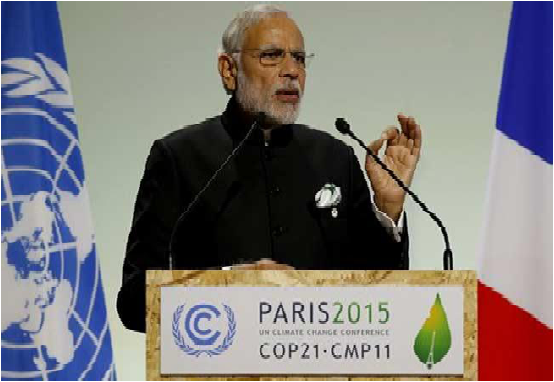- The prosperous still have a strong carbon footprint. And, the world’s billions at the bottom of the development ladder are seeking space to grow. So, the choices are not easy. But, we have awareness and technology. We need now national will and a genuine global partnership.
- Democratic India must grow rapidly to meet the aspirations of 1.25 billion people, 300 million of whom are without access to energy. We are determined to do so, guided by our ancient belief that people and planet are inseparable; that human well being and Nature are indivisible. So, we have set ambitious targets. By 2030, we will reduce emissions by 33 to 35% per cent of 2005 levels, and 40 per cent of our installed capacity will be from our non- fossil fuels. We will achieve it by expanding renewable energy – for, example, by adding 175 Gigawatts of renewable generation by 2022. We will enlarge our forest cover to absorb at least 2.5 billion tonnes worth of carbon dioxide.
- We are reducing dependence on fossil fuel through levies and reduction in subsidies; switching sources of fuel where possible; and, transforming cities and public transportation. We hope advanced nations will assume ambitious targets and pursue them sincerely. It is not just a question of historical responsibility. They also have the most room to make the cuts and make the strongest impact. And, climate justice demands that, with the little carbon space we still have, developing countries should have enough scope to grow. This also means aggressive mitigation action by developed countries before 2020, including ratification of 2nd Commitment period of Kyoto Protocol, removing conditions and revisiting targets.
- The principles of equity and common but differentiated responsibilities must remain the bedrock of our collective enterprise across all areas – mitigation, adaptation and means for implementation. Anything else would be morally wrong; and disparities.
- Developed countries must fulfill their responsibility to make clean energy available, affordable and accessible to all in the developing world. This is in our collective interest. So, we look to the developed countries to mobilize 100 billion US Dollars annually by 2020 for mitigation and adaptation in the developing countries. They must fulfill their commitment in a credible, transparent and meaningful manner.
- The presence of 196 countries tells us that we have a chance to unite behind a common purpose. We will succeed if we have the wisdom and courage to craft a genuinely collective partnership that balances responsibilities and capabilities with aspirations and needs.
(The views expressed are the author's own and do not necessarily reflect the position of the organisation)


